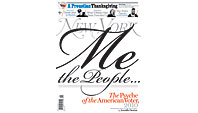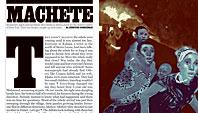
1. Jennifer Senior’s cover story exploring the narcissistic tendencies of the American electorate (“The Benjamin Button Election,” November 8) definitely got readers thinking, though, predictably, it doesn’t seem to have stopped very many of them from using the I-word in expressing their hopes that the country would cease being so self-involved. “I want to believe that change can happen,” wrote the blog Truth Plus, “that we can think of others instead of just ourselves. I want to believe that the thoughtful among us can hold our ground and help this country improve, instead of just voting for the other party every time we don’t get our way.” “I, for one,” wrote a commenter on nymag.com, “never expected change to happen overnight. I’m not so foolish as to expect all of our problems to magically disappear.” And the same I continues: “I think a lot of people are anxious and afraid, and they were truly hoping Obama would come through on all of his promises right away.” Some found the entire premise of this story smug. “Telling Americans that the elites are smarter than us dumb children isn’t working for Obama, and it will not help the media elite neither,” argued a commenter. “If our political and media elites were half as smart as they think they are, America would not have the problems and discontents that we are mired in today.” Others, possibly anticipating this week’s cover story, tried to look for the silver lining—and actually found one. Caroline Miller, former editor of New York, wrote: “It was a relief to more than a few of us that Christine O’Donnell, Sharron Angle, and Carl Paladino didn’t make the cut. If there’s no such thing as too crazy to get a lot of attention from the political press, maybe there is such a thing as too crazy to get elected. Small relief, but it’s something.”
2. Book critic Sam Anderson’s early-midlife discovery of rap as an art form—albeit one to be found in a book—(“Straight Outta Comp 101,” November 8) elicited a flood of comments as crackling and varied as any Big Daddy Kane track. “I’ve always had a thing for rap that people can’t seem to square with my love of Shakespeare,” wrote a commenter on nymag.com. “Thanks for making the case that I’ve always made: The best rap equals poetry. However, how did you get through an article about genius lyricists without mentioning Lauryn Hill?” Others castigated Anderson for his lack of prior rap knowledge (a crime for which he’d already pleaded guilty, after all). “Sam Anderson didn’t learn to like hip-hop by reading this book,” wrote the blog Too Many Books in the Kitchen. “He just continued to like poetry (or at least rap lyrics as jammed into a poetry-shaped hole). Hip-hop is not poetry—it’s music. At some point you have to engage with snippets from old kung fu movies and percussion that sounds like gunfire.” But his crossover also had plenty of defenders. “Personally, I really enjoyed the newbie’s perspective,” wrote a commenter. “He isn’t writing for an insulated community of rap fans. Not that rap needs help becoming more mainstream, but it does warrant a greater appreciation as an art form by lyric geeks less educated than ourselves. He’s just dropping knowledge! Give him a break!” NPR’s the Record blog asked Anderson to reassess after listening to some rap. Anderson did—and opened up a whole new aural universe to criticize. “I think the rappers who impressed me most on the page were the ones whose ‘literary’ effects were easiest to pick up with the eye,” said Anderson. “But then you listen and realize that rappers create all of those effects out loud in really unusual ways—bending and stretching words, unnaturally stressing words, shouting certain syllables and deadening others.”

3. Jennifer Gonnerman’s depiction of the life and death of teenager Mohammad Jalloh, who escaped Sierra Leone only to be murdered in Washington Heights (“Machete,” November 8), touched deep chords among readers. “Heartbreaking story,” wrote the Washington Post’s Story Lab blog. “The piece is great because of what the reader learns along the way: about Sierra Leone, about the Bronx, about the African community in New York—worlds within worlds.” “I was sincerely touched by Jennifer Gonnerman’s article. I cannot fathom the sense of loss of the Jalloh family has experienced,” wrote reader Klint Callaghan. Some thought the story was too personal. “This journalist writes beautifully,” added a commenter familiar with the Jalloh family. “I can’t ignore that this is a story that is very fresh, too fresh. We love M.J. We miss him every day. We want to respectfully remember him, not exploit the journey his family endured just to have a great story.” But others who knew him thought it was a fitting tribute. “He was smart, determined, and a proactive kid who wanted to experience the world more,” wrote another commenter who was familiar with M.J. “This is a wonderful and well-written article, it is so good, sad, and very well done. Thank you.”
Send correspondence to: comments@nymag.com